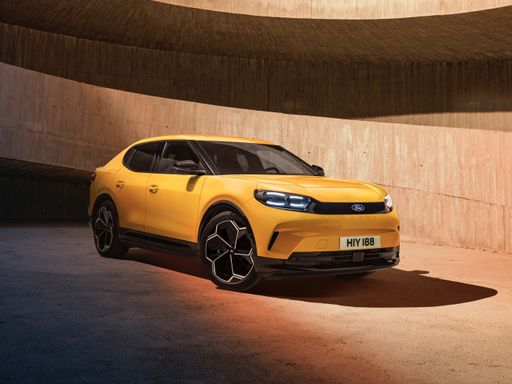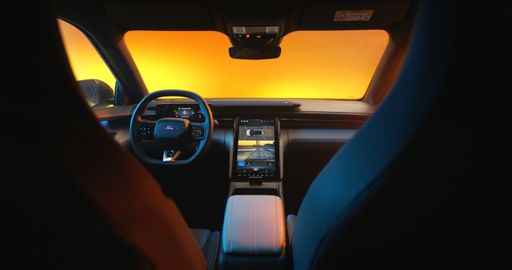Ford Capri vs Renault Express – Differences & prices compared
Compare performance, boot space, consumption and price in one view.
Find out now: which car is the better choice for you – Ford Capri or Renault Express?
The Ford Capri (SUV) comes with a Electric engine and Automatic transmission. In comparison, the Renault Express (Cargo Van) features a Diesel or Petrol engine with Manuel transmission.
When it comes to boot capacity, the Ford Capri offers 572 L, while the Renault Express provides – depending on how much space you need. If you’re looking for more power, decide whether the 340 HP of the Ford Capri or the 102 HP of the Renault Express suits your needs better.
In terms of consumption, the values are 13.80 kWh per 100 km for the Ford Capri, and 4.60 L for the Renault Express.
Price-wise, the Ford Capri starts at 36300 £, while the Renault Express is available from 17100 £. Compare all the details and find out which model fits your lifestyle best!
Ford Capri
The Ford Capri is a classic car that captivated enthusiasts with its sleek design and sporty appeal. Its long bonnet and distinctive styling made it a standout on the roads, earning it the nickname "The Car You Always Promised Yourself." With a charismatic blend of performance and charm, the Capri remains a beloved icon in the automotive world.
details @ media.ford.com
@ media.ford.com
 @ media.ford.com
@ media.ford.com
Renault Express
The Renault Express brings a fresh design to the van segment, combining practicality with modern styling cues. Its spacious interior and clever storage solutions make it an ideal choice for both business and leisure purposes. With a focus on comfort and functionality, this vehicle stands out as a versatile option for those in need of reliable transportation.
details

|
|
|
|
|
Costs and Consumption |
|
|---|---|
|
Price
36300 - 50900 £
|
Price
17100 - 19500 £
|
|
Consumption L/100km
-
|
Consumption L/100km
4.6 - 6.6 L
|
|
Consumption kWh/100km
13.8 - 16.4 kWh
|
Consumption kWh/100km
-
|
|
Electric Range
374 - 627 km
|
Electric Range
-
|
|
Battery Capacity
52 - 79 kWh
|
Battery Capacity
-
|
|
co2
0 g/km
|
co2
121 - 149 g/km
|
|
Fuel tank capacity
-
|
Fuel tank capacity
50 L
|
Dimensions and Body |
|
|---|---|
|
Body Type
SUV
|
Body Type
Cargo Van
|
|
Seats
5
|
Seats
2
|
|
Doors
5
|
Doors
4
|
|
Curb weight
1914 - 2174 kg
|
Curb weight
1296 - 1390 kg
|
|
Trunk capacity
567 - 572 L
|
Trunk capacity
-
|
|
Length
4634 mm
|
Length
4393 mm
|
|
Width
1872 mm
|
Width
1775 mm
|
|
Height
1626 mm
|
Height
1811 mm
|
|
Payload
570 - 587 kg
|
Payload
575 - 700 kg
|
Engine and Performance |
|
|---|---|
|
Engine Type
Electric
|
Engine Type
Diesel, Petrol
|
|
Transmission
Automatic
|
Transmission
Manuel
|
|
Transmission Detail
-
|
Transmission Detail
Manual Gearbox
|
|
Drive Type
Rear-Wheel Drive, All-Wheel Drive
|
Drive Type
Front-Wheel Drive
|
|
Power HP
170 - 340 HP
|
Power HP
75 - 102 HP
|
|
Acceleration 0-100km/h
5.3 - 8.7 s
|
Acceleration 0-100km/h
11.9 - 16.3 s
|
|
Max Speed
160 - 180 km/h
|
Max Speed
100 - 167 km/h
|
|
Torque
310 - 679 Nm
|
Torque
200 - 240 Nm
|
|
Number of Cylinders
-
|
Number of Cylinders
4
|
|
Power kW
125 - 250 kW
|
Power kW
55 - 75 kW
|
|
Engine capacity
-
|
Engine capacity
1332 - 1461 cm3
|
General |
|
|---|---|
|
Model Year
2024 - 2025
|
Model Year
2021
|
|
CO2 Efficiency Class
A
|
CO2 Efficiency Class
D, E
|
|
Brand
Ford
|
Brand
Renault
|
Ford Capri
The Legendary Ford Capri Reimagined: A Modern Marvel
In the world of automotive icons, the Ford Capri holds a special place. Originally launched in the late 1960s, it was once heralded as the car you always promised yourself. Today, Ford has reimagined this classic in a modern electric form, combining nostalgic appeal with cutting-edge technology.
Performance and Powertrain Unleashed
One of the standout features of the new Ford Capri is its electric powertrain. Offering a range of power options, from a capable 170 PS to a formidable 340 PS, the Capri caters to diverse driving preferences. The electric motor ensures a smooth, quiet ride, while different battery configurations provide varying degrees of range and power output. The torque, ranging from 310 to 679 Nm, guarantees swift acceleration and a responsive driving experience.
Revolutionary Battery Technology
The heart of the new Capri lies in its advanced battery technology, with capacities ranging from 52 kWh to 79 kWh. This allows for impressive driving ranges between 560 km and 627 km on a single charge—perfect for both city commuting and longer road trips. The efficient energy consumption of 13.3 to 15.8 kWh/100km is indicative of Ford's commitment to sustainability, achieving a CO2 emission rating of 0 g/km.
Design and Dimensions: A Mix of Past and Future
The Capri's exterior design retains a nod to its classic lineage while embracing modern SUV styling. With dimensions measuring 4634 mm in length, 1872 mm in width, and 1626 mm in height, it offers a spacious interior while maintaining a sleek and dynamic profile. The aerodynamic design not only enhances the aesthetic appeal but also contributes to its efficiency.
Luxurious Interior and Technology
Inside, the Ford Capri continues to impress with a refined and comfortable interior. With seating for five, the car offers ample space and premium materials, making every journey a delight. The cabin is equipped with the latest technology, ensuring connectivity and entertainment on the go. Whether you opt for the Premium or AWD versions, Ford delivers a high standard of comfort and convenience.
Safety and Innovation at Its Core
Safety has always been a priority for Ford, and the Capri is no exception. It comes equipped with a host of advanced safety features and driver assistance systems. Innovations in sensor technology and intelligent braking ensure that drivers and passengers alike are protected under various driving conditions. The Capri's robust structure complements its high safety standards.
Conclusion: A Vision of the Future
The reborn Ford Capri represents a fusion of heritage and future-forward design. Its all-electric powertrain and impressive range of features make it a serious contender in the modern automotive landscape. With sustainability and performance at its core, this classic has been adeptly reimagined for the eco-conscious and tech-savvy driver of today.
Renault Express
Introduction to the Renault Express
The Renault Express, a compact van from the renowned French manufacturer, continues to make a lasting impression in the versatile light commercial vehicle segment. With its practical design and array of engine configurations, it caters to a wide spectrum of business needs, offering both diesel and petrol variants. As we delve into the details, we'll explore the specifications and innovations that set the Renault Express apart from its competitors.
Efficient Powertrains
The Renault Express boasts a diverse range of engines tailored for efficiency and performance. At the core, it features a selection of both diesel and petrol engines, with outputs ranging from 75 PS to 102 PS. This ensures that operators can select a powertrain that precisely matches their performance requirements and budget constraints.
Whether you opt for the BLUE dCi diesel engine or the TCe petrol variant, the Renault Express promises robust performance combined with impressive fuel economy ranging from 4.6 to 6.6 L/100km. The manual transmission and front-wheel drive configuration further contribute to its efficient operation.
Practicality and Usability
Designed with practicality in mind, the Renault Express excels in usability. With a load capacity ranging from 575 to 700 kg, it provides adequate cargo space for business users. Its compact dimensions—measuring 4,393 mm in length, 1,775 mm in width, and 1,811 mm in height—ensure it remains manoeuvrable even in tight urban environments.
The van’s 50 L fuel tank complements its fuel-efficient nature, minimizing the frequency of refuelling stops and enhancing productivity.
Comfortable and Functional Interior
Inside the Renault Express, a no-nonsense cabin offers comfort and functionality across its two-seat configuration. The straightforward yet ergonomic layout is designed for those who spend significant time on the road. Essential features are included to support the driver, ensuring a pleasant experience even during long journeys.
Safety and Innovation
Renault has not compromised on safety with the Express. With modern safety protocols, the van aims to offer peace of mind to its occupants. Although it's built primarily for utility, the inclusion of essential safety features demonstrates Renault’s commitment to protecting its drivers and cargo.
Innovation is further represented through its environmental considerations, such as the CO2 efficiency class spanning D to E, and emissions ranging from 121 to 149 g/km. This conscientious engineering underscores Renault’s efforts towards a more sustainable future.
Final Thoughts
In conclusion, the Renault Express is a testament to Renault's expertise in crafting efficient, reliable light commercial vehicles. Its blend of power, economy, and practicality makes it a competitive choice for businesses seeking a dependable partner on the road. With a starting price point that remains accessible, the Renault Express continues to deliver exceptional value to its customers, making it a standout in the small van category.
Which drive types are available for the Ford Capri?
Available as Rear-Wheel Drive or All-Wheel Drive.
The prices and data displayed are estimates based on German list prices and may vary by country. This information is not legally binding.
